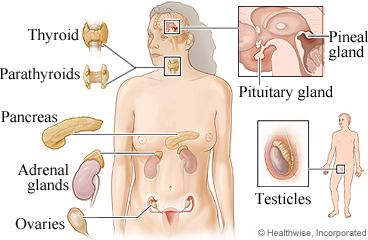What does the endocrine system do?
Your endocrine system is made up of glands in your body. These glands send hormones into your bloodstream.
Hormones are chemicals that tell cells and organs what to do. Your body makes hundreds of hormones. They help control things like your appetite and your blood pressure. They even play a role in how your body reacts to stress. An example is the way insulin tells your cells how to use sugar for energy. Sex hormones control male and female traits, puberty, childbirth, and menopause.
How can you prevent endocrine problems?
Some endocrine problems, like type 1 diabetes, can't be prevented. But there are things you can do to prevent other problems or make them better:
- Stay at a healthy weight. Eat healthy foods and get plenty of exercise. This can help prevent or delay type 2 diabetes.
- Include iodine in your diet. It can help prevent thyroid problems. When you use salt, choose iodized salt over other kinds of salt.
- Make sure all your doctors know about any hormones you're taking. These may include birth control medicine, thyroid hormone, insulin, or hormone therapy for menopause.


